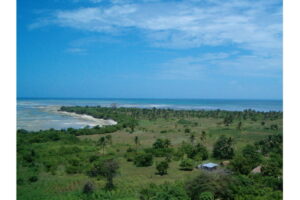Tanzania is one of ten countries in Africa with natural gas resources. The East African nation of more than 55 million people stands on 57.74 Trillion Cubic Feet (TCF) of natural gas, located in the SongoSongo gas fields in Lindi and Mnazi Bay in Mtwara regions.
According to Ministry of Energy records, up to now, Tanzania has consumed about 0.5TCF of its natural gas, thus, more exploration is underway to make Tanzania the next-sub-Saharan powerhouse in natural gas. Hence, this draws the most important question: How can Tanzania transform its natural gas potential via effective participatory natural gas economy governance?
Natural Resource Governance Institute (NRGI) governance index depicts an important narrative in this context. According to the NRGI-2017 governance index, Tanzania oil and gas (O&G) sector scored 53 points out of 100 (per NRGI standards, it has a weak position), making Tanzania the 39th state out of 81 analyzed globally.
In the same context, on value realization, which comprises licensing, taxation, local impact and state-owned enterprises, Tanzania scored 65 points (12th/89).
In revenue management, including national budgeting, subnational resource revenue, and sovereign wealth funds, Tanzania scored 40 points (48th/89).
On the enabling environment comprised of civic education, right awareness, and empowerment as well as accountability, government effectiveness, regulatory quality, the rule of law, control of corruption and political stability, Tanzania recorded 53 points (40th/89).
Mtwara economy landscape
Mtwara region has the richest cashew nut cultivation potential in Tanzania. Mtwara is the shining light of cashew nut production and exports in Tanzania. Despite recent drawbacks in cashew nut auctions in the fiscal year 2017/2018, Mtwara stands strong with over 100,000 tons of cashew yield per year.
According to the region’s socio-economic profile, this strategic region occupies 16,710 square kilometres in landmass, making up 1.7 per cent of Tanzania’s total mainland. At the same time, 2018 population predictions by the National Bureau of Statistics show the region to have more than 1.4 million people.
The region’s economic affairs encompass agriculture, fisheries, services, and industrial activities. Hence, the new natural gas landscape has moulded a new perspective within the social-economic parameters, which have sparked necessary conversations on how and when the region can emerge as a solid-economic pillar for a natural gas success story in Tanzania.
In 2013, the region saw the emergence of a new natural gas economy landmark, involving foreign and domestic or state-owned natural gas companies venturing for a stake in the natural resource, including the 532 Kilometer (KM) natural gas pipeline construction from Mtwara to commercial-pulse Dar es Salaam, costing over $1.23 billion.
Why natural gas economy governance matters?
According to the International Union for Conservation of Nature (ICUN), natural gas economy governance commands the norms, institutions and processes that determine how power and responsibilities over natural resources are exercised, how decisions impact the constituents of the region and how citizens (in this case people in Mtwara and the rest of Tanzania), women, men, indigenous peoples, and local communities, participate and benefit from the management of natural resources.
Tanzania has only explored a small fraction of the natural gas reserves (0.5 TCF out of 57.74TCF), and in order to explore further socio-economic and political affairs ought to be aligned perfectly to ensure that the production of natural gas comes with blessings and not a curse, as manifested in some African nations.
A Tanzanian policy research think tank–Economic and Social Research Foundation (ESRF)–converged with local government authority officials, to discuss how governance gaps in planning and management of the natural gas economy in Mtwara can be addressed.
According to the ESRF report, which highlighted key aspects of the discussion published in July 2017, worked out comprehensive issues from stakeholders, fenced within inter-government cooperation and citizen involvement, management of revenues and expenditures, sustainable development efforts, land-use conflicts, social and environmental impacts, and seizing entrepreneurial opportunities.
As the report indicates, inter-government cooperation and citizen involvement which has been a key denominator in the success or failure of natural resource governance over the African landscape, can close the knowledge gap that exists via a deliberate process organized at all levels (regional, district and lower levels), but also–via ensuring feedback information among officials and the citizens of Mtwara.
Further, regional and district levels must be staffed with energy sector experts who translate technical issues into the local context. Consequently, it enabled the domestication of natural gas complex issues and closing of the knowledge gap to these communities.
“Managing expectations deserves high priority. The citizens need to be helped to appreciate that benefits from the gas economy can be influenced by how they position themselves and what preparations they actually make to take advantage of the gas economy,” the report argues.
Management of revenue and expenditures is important in this context, it is argued that the local government should provide knowledge on the meaning and application of various kinds of non-tax revenue sources especially royalties and service levies and knowledge on domestic use and transported gas to Dar es Salaam for further internal consumption, including power generation in the national grid and for onward export.
According to the Ministry of Energy, until May 2019, Tanzania Petroleum Development Corporation (TPDC) had collected over $210 million (from gas sales and exploration), exceeding the intended target of over $171 million for the fiscal year 2018/2019.
“Citizens should be informed regularly about the revenue and expenditure of the finances generated or received at the village irrespective of the sources of funds. This means that funds from all sources should be integrated into the budgets at local government or village level and be managed in a transparent manner through regular meetings and/or use of notice boards in the respective levels of government,” the report reads.
Additionally, it was found that the revenue required to fund development projects should be spent in accordance with planned activities.
More importantly, the regional government should ensure that monitoring of the enforcement of laws and regulations relating to the use of finances and education in the communities is actually implemented.
“Action should be taken to provide more education on how these dedicated groups may benefit from the gas economy and facilitate identification of opportunities of the benefits from the gas economy and awareness on what actions they should take to harness opportunities from the gas economy”, the report argues.
Unequivocally, the report also highlighted the role of local governments in assisting local entrepreneurs in securing reliable markets for their locally made products, but also providing them with awareness in adding value to their activities. However, more importantly, it was argued that the region could establish a marketing desk entrusted with the task of networking with other market development institutions in the country and beyond to improve access to appropriate markets.
Source: allafrica.com
Share this news
This Year’s Most Read News Stories

Cracks show as Zanzibar’s CCM ruling party looks to 2025 polls
Cracks show as Zanzibar’s CCM ruling party looks to 2025 polls over Mr Karume’s allegation against the administration. Time for the ruling party to take stock?Continue Reading

Muslims in Pemba conduct special prayer against ZAA decision
ZANZIBAR: More than 200 Muslims in Vitongoji Village, South Pemba Region over the weekend conducted a special prayer to condemn the Zanzibar Airports Authority (ZAA) move to appoint DNATA as the sole ground handler in Terminal III of the International Airport of Zanzibar. Abeid Amani Karume.Continue Reading

Africa: Rwanda Gets a Grip Of Marburg, But Mpox ‘Not Yet Under Control’

Monrovia — The Rwanda Minister of State responsible for Health, Dr. Yvan Butera, cautioned that while the country is beginning to see positive signals in its fight against the Marburg virus, the outbreak is “not yet over”. He, however, expressed hope that “we are headed in that direction”. The minister said the epidemiology trend, since the disease was first discovered in the country more than a month ago, is moving towards fewer cases.
Dr. Butera, who was giving updates during an online briefing yesterday, said in the past two weeks, only two deaths were recorded while 14 people recovered from the disease. He said Rwanda was expanding its testing capacity with 16,000 people already inoculated against the disease.
The priority right now, Butera said, is “rapid testing and detection”.
Marburg is a highly virulent disease transmitted through human-to-human contact or contact with an infected animal. The fatality rate of cases, which has varied over the period, is more than 50%, according to the World Health Organization. WHO said the highest number of new confirmed cases in Rwanda were reported in the first two weeks of the outbreak. There’s been a “sharp decline” in the last few weeks, with the country now tackling over 60 cases.
At Thursday’s briefing, a senior official of the Africa Centers for Disease Control, Dr. Ngashi Ngongo, said mpox – the other infectious disease outbreak that countries in the region are fighting – was been reported in 19 countries, with Mauritius being the latest country to confirm a case. He said although no new cases have been recorded in recent weeks in several countries where outbreaks occurred previously – including Cameroon, South Africa, Guinea, and Gabon – Uganda confirmed its first Mpox death. This, he said, is one of two fatalities reported outside Central Africa.
Dr. Ngashi revealed that there was an increase in cases in Liberia and Uganda. He said mpox cases were still on an upward trend.
“The situation is not yet under control.”
Source: allafrica.com











